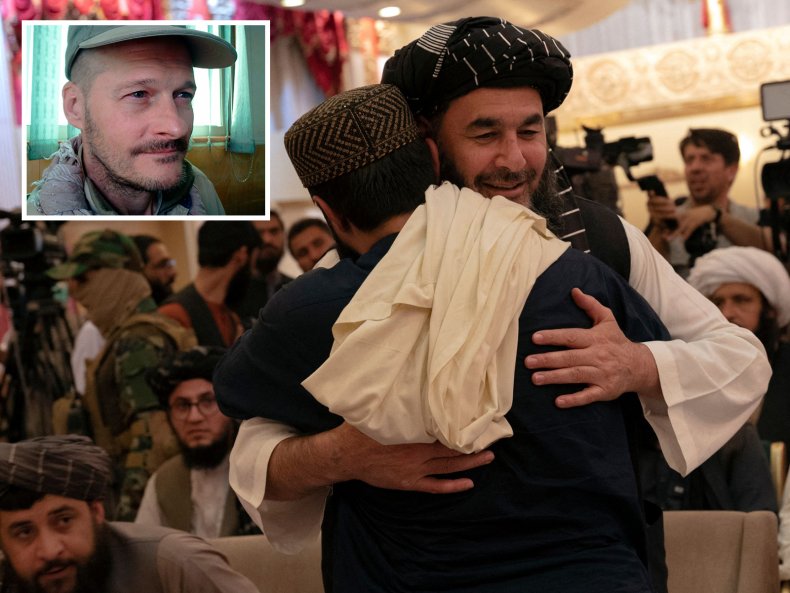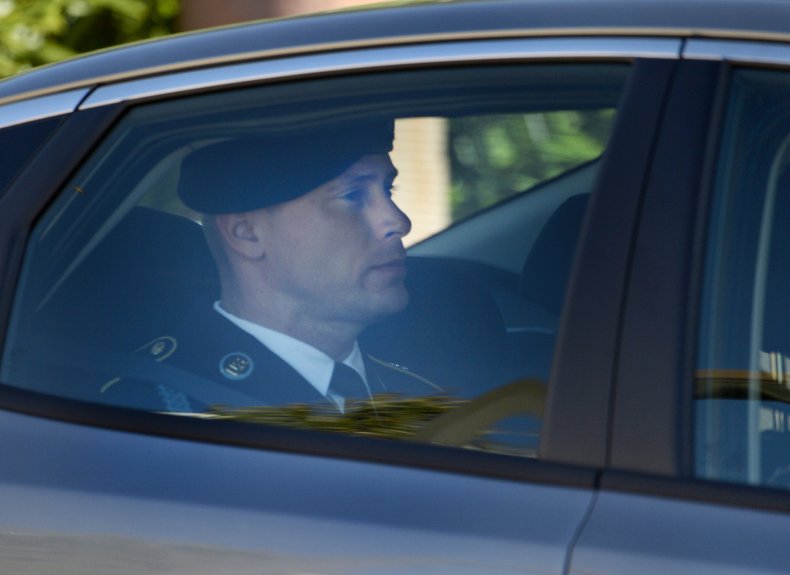Before President Joe Biden ultimately approved the release of Bashar Noorzai in exchange for U.S. hostage Mark Frerichs, the influential Afghan tribal leader and Taliban associate who had been imprisoned in the U.S. on drug trafficking charges since 2005 had been the center of prisoner swap talks for at least a decade, according to a retired Special Forces officer familiar with the negotiations.
More than 11 years before U.S. contractor and Navy veteran Mark Frerichs was seized by the powerful Haqqani network in January 2020, a development first reported the following month by Newsweek, the same Taliban-aligned group captured U.S. Army soldier Bowe Bergdahl, who deserted his post prior to his 2009 disappearance.
Bergdahl was ultimately released in a 2014 deal overseen by President Barack Obama, whom Biden served as vice president, in exchange for five high-ranking Taliban captives.
But Jason Amerine, a retired Army lieutenant colonel who led a team tasked with securing Bergdahl's freedom, said Noorzai was first named as a candidate for rekindling stalled effort to recover the U.S. soldier.
"The Noorzai deal was a long time coming," Amerine told Newsweek. "Back in 2012, negotiations with the Taliban for the release of Bergdahl had fallen apart, and we were given the mission of finding a way to get the POW home. We did our research and believed Noorzai would be an ideal option."
Amerine argued that Noorzai was chosen not only because of the Taliban's interest in bringing him home, but also because of the controversial circumstances in which he was arrested in the first place.

Noorzai, who returned to senior Taliban-led celebrations in Kabul on Monday after spending some 17 and a half years in U.S. captivity, was arrested in New York in 2005 while on a self-styled diplomatic mission during a particularly bloody stage in the U.S.-led war in Afghanistan launched in the wake of 9/11. He had reportedly been offered assurances that he would not be detained, and Amerine was among those who felt he never should have been.
"He was a U.S. ally before being imprisoned, and even those involved in his arrest believed it had been a mistake," Amerine said. "But Noorzai was wrapped up in the U.S. policy of getting rid of Afghan warlords to promote democracy in Afghanistan, a policy that came back to haunt us over the years, especially last year when Afghanistan collapsed without a fight."
The ethnic Pashtun leader was believed to have far-reaching connections among various players in Afghanistan, including among Pakistan's Inter-Services Intelligence (ISI) and the Haqqani network, which operates across the porous, restive border between the two nations. His arrest and eventual life sentence for allegedly trying to smuggle more than $50 million worth of heroin into the United States angered the Taliban, which has sought his return ever since.
Rather than support peace in the region, Amerine said Noorzai's capture aggravated the situation.
"Noorzai wasn't the Pablo Escobar people made him out to be," Amerine said. "He controlled a large portion of Afghanistan, and that included the drug trade. His imprisonment destabilized the area and was an enormous blunder in our counterinsurgency fight."
But due to his importance to the complex tribal ecosystem of southern Afghanistan, Amerine felt the Taliban would be willing to support a trade, not just for Bergdahl, but for several foreigners held by the Islamist group.
"We proposed the trade to the Taliban as a swap for Bergdahl and a number of Western hostages held in Pakistan," Amerine said. "Pakistan's ISI informally supported the deal, because the ISI had a good relationship with Noorzai and saw him as a stabilizing influence in southern Afghanistan. They actually helped promote the trade."
By the time talks restarted, however, he said the State Department had presented another proposal.
"When the Taliban returned to the negotiating table, apparently ready for the trade, the State Department instead offered the five Taliban they had wanted to trade for years and the Taliban accepted that deal instead," Amerine said. "Who wouldn't? We offered Noorzai for Bergdahl and five hostages. Instead, the Taliban received five Taliban officials for Bergdahl."
Amerine referred to the release of the so-called "Taliban Five" consisting of former Guantanamo Bay detainees Abdul Haq Wasiq, Norullah Noori, Mohammad Fazl, Khairullah Khairkhwa and Mohammad Nabi Omari as "a calamity politically" that "did nothing to further the peace process as the State Department had hoped."
All five men have since gone on to serve in senior positions of the Taliban-led Islamic Emirate established in the wake of the U.S. withdrawal from Afghanistan last August.
And in the years since Bergdahl's release, Amerine said that "the Taliban continued to seek Noorzai's release now that it appeared to be an option open to them." Today, Amerine is expressing his support for swapping Noorzai for Frerichs, though he said the deal could have been made much sooner if the U.S. had taken the necessary steps to do so.
"Frerichs' release seemed imminent as a trade for Noorzai over a year ago," Amerine said, "but the political repercussions of Afghanistan's complete collapse seemed to stall the deal, since the Biden administration wanted no further black eyes."
"I felt terrible for his family over the last year," he added, "since he could have been released a while ago if politics hadn't stalled the deal."

The release of Frerichs on Monday was made public in a statement by Biden, who said the outcome was "the culmination of years of tireless work by dedicated public servants across our government and other partner governments." He said the effort required "difficult decisions" to be made, a likely reference to Noorzai's release.
Reached for comment, the State Department referred Newsweek to a senior administration official's call with reporters shortly after the president's announcement.
The senior official said that a number of government experts consulted on the matter had reached the conclusion that Noorzai's release "would not materially change any risk to Americans or fundamentally alter the contours of the drug trade" in Afghanistan.
The official also revealed that Biden made the decision in June to release Noorzai in order to secure Frerichs' release. Asked about the delay, the official said that "it still takes quite a bit to work out something like this, including something as logistically challenging as having confidence on both sides of an arrangement like this that it will go forward as agreed to."
"It took some time to get from that readiness to proceed, to actually being prepared to do so," the official added. "But once it became clear that we could be confident in doing so, we moved extraordinarily quickly and were able to get this done, and obviously are pleased by the result."
Newsweek had reported more than a year ago during the collapse of the Afghan government in August 2021 that the Biden administration was supportive of such a trade pending proof of life, which ultimately emerged in April. Since breaking the news of Frerichs' initial disappearance, Newsweek has discussed the case with Frerichs' family and senior officials of the U.S. and the Taliban, including Anas Haqqani, who celebrated Noorzai's released on Monday in a statement posted to Twitter.
At his welcome reception in Kabul, Noorzai expressed gratitude to the Taliban leadership for his efforts in securing his return, as did Foreign Minister Amir Khan Muttaqi, who said "praise be to God, today in Afghanistan, instead of the system that used to arrest its own Afghans and hand them over to foreigners, there is a system that frees its Afghans from foreigners at any cost and reunites them with their families," according to ministry spokesperson Hafiz Zia Ahmad.
As for Frerichs, the senior Biden administration official described his health as "stable" as he prepared to depart for home from Qatar, which was credited with playing a key role in facilitating the U.S.-Taliban talks that led to Monday's news.
"The continued facilitation efforts by the state of Qatar resulted in freeing US Contractor Mark Frerichs from his imprisonment in Afghanistan. Mr. Frerichs will head to the United States from Doha soon," a Qatari Foreign Ministry source told Newsweek. "Qatar remains committed to facilitating dialogue and protecting the interests of its allies and partners."
Frerichs' family has expressed gratitude to the president and top administration officials for his release.
"My brother is alive and safe because President Biden took action," Frerichs' sister, Charlene Cakora, said in a statement shared with Newsweek. "There were some folks arguing against the deal that brought Mark home, but President Biden did what was right. He saved the life of an innocent American veteran."
This article has been updated to include a statement from a Qatari Foreign Ministry source and to accurately spell Jason Amerine's name.








